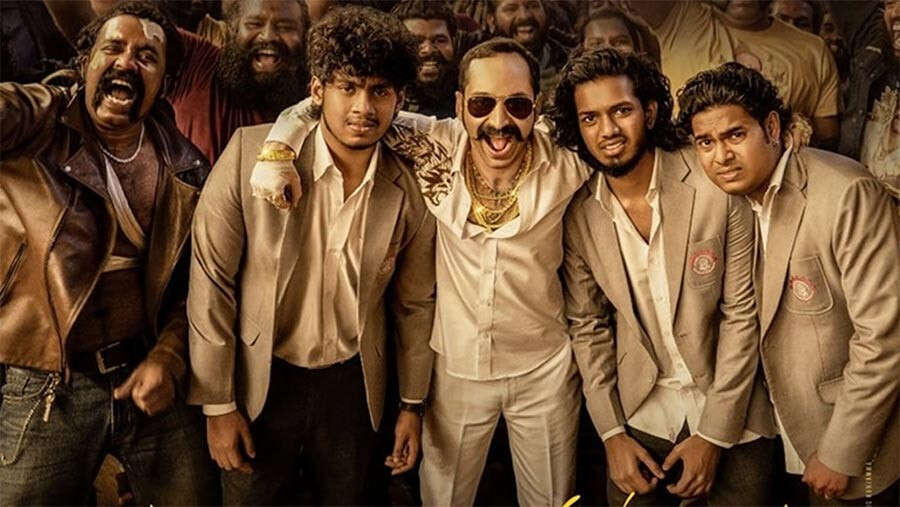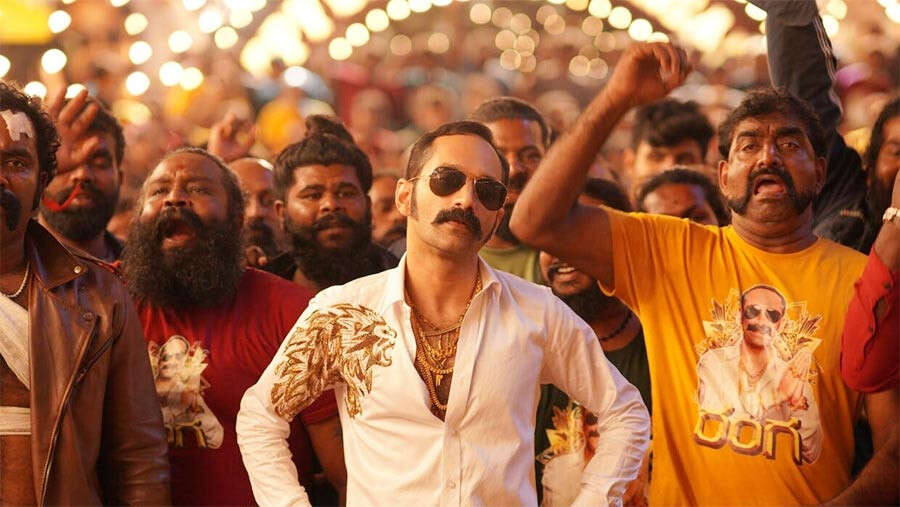There’s a scene in Aavesham; Someplace in the course of all of the mayhem, neon chaos, and rhythmic beatdowns, the place Fahadh Faasil’s Ranga, wearing his signature blinding whites and gold thick sufficient to anchor a ship, leans again in a chair at a bar as he watches his three new college-going buddies and his gang engaged in drunken revelry. In that second, he isn’t a part of the laughter; he’s orbiting it, a spectator to the very world he seems to command. The grin stays, however it’s the grin of a person who is aware of pleasure might be hosted, by no means owned; for all his noise and swagger, Ranga stays the loneliest man within the room.
On the actor’s birthday, as we glance again at his many onscreen outings, Aavesham feels just like the loudest outlier amongst all his movies. And but, it could be one in all his most layered roles.
Swagger, Solitude, and the Insanity in Between
Let’s be trustworthy. When Aavesham first dropped its trailer, most of us anticipated a punchline gangster in a glorified cameo from Fahadh in what seemed like a school comedy. What we bought as a substitute was a full-blown fever dream named Ranga. A swaggering, unhinged, oddly tender underworld don from Bengaluru with a code of honour and the center of a bruised youngster.
White kurta-pyjama. Handlebar moustache. Aviators at evening. A voice so unpredictable it shifts octaves mid-sentence. He’s violent, useless, and really, very humorous. However the genius of Fahadh’s efficiency lies within the quiet pauses and the way he listens greater than he speaks, how his eyes typically betray what his mouth refuses to confess.
In an interview after the movie’s launch, director Jithu Madhavan insisted that there was nothing really layered or ‘authentic’ in Ranga as a person. “He steals his mentor Reddy’s white and gold look simply because it is handy; and later, when he needed to change his apparel, he switched to black and silver, one more handy alternative. That is all Ranga is. There’s nothing deeper to the character,” he stated.
Possibly that is what the director supposed on paper, however the eventual look of Ranga on display screen along with his signature “Eda Mone” swagger gave us somebody who, past his loudness, eccentricities, and quirkiness, gave us a personality that clicked on a deeper degree with the viewers.
The director additionally revealed that Ranga was initially written as a failed actor. The backstory was finally scrapped for narrative circulate, however the residue remained. Fahadh reiterated this in one other interplay. “Throughout the first two weeks of filming, he (Jithu Madhavan) advised me, ‘This man observes properly and if two individuals are speaking, he’ll observe them and smile’. It’s not utilized in any a part of the movie, however Ranga was that. Even when he’s not there in a dialog, he’s having fun with it.”

There’s one thing performative about Ranga: how he strikes, how he talks, how he expects his males to clap and cheer even when he’s simply doing a roll name. He’s a person who desires to be cherished however doesn’t know tips on how to ask for it. That context unlocks a lot of what we see on display screen. Take the towel dance sequence. The now-iconic second the place Ranga twirls round his mansion, shirtless, jubilant, and fully uninhibited. It’s hilarious, positive, but in addition heartbreakingly lonely. He isn’t performing for anybody. That’s simply how he exists. Alone. In love with the concept of being cherished.
Nazriya, Fahadh’s real-life spouse, jokingly advised him, “For those who’re going to be shirtless, a minimum of look presentable.” It was stated in jest, however it captures what makes Ranga so watchable. He’s not polished. He’s uncooked and unscripted — a person on the mercy of his personal impulses.
Betrayals and Beatdowns
As a lot as Ranga appears like an explosion of eccentricities, Aavesham progressively reveals the person behind the parable. When he takes the three faculty boys beneath his wing, it’s not simply out of responsibility. He likes them. He laughs with them. He buys them items. He protects them. So, when the betrayal comes, his heartbreak is palpable.
In one of many movie’s most gut-punching scenes, Ranga locks himself in and murmurs: “Nobody has ever come near me except they wanted one thing.” The amount’s low, however the weight of the road hits laborious. Fahadh performs it with such vulnerability, it nearly feels intrusive to observe. That second, just some seconds lengthy, shifts all the emotional arc of the character.

Violence as a Language
Ranga doesn’t elevate his hand except he completely has to. He makes it a degree, hinting at his late mom’s unfulfilled want to see him by no means take pleasure in violence once more. However when he does lastly snap; when he lets go of restraint, the transformation is each awe-inspiring and terrifying. The Holi sequence, the place he and his gang unleash hell in a swirl of colors and punches, is brutal and balletic. Much more so through the ultimate encounter between Ranga and Reddy’s gang. It’s catharsis. And it’s earned.
A Legacy within the Loud
Ranga, for all his extra, grew to become a cultural second. Meme pages turned his dialogues into ringtones. His dance strikes invaded reels. And but, the rationale Ranga caught wasn’t simply the aesthetics. It was the ache; the ache of a person who needed to be seen, not simply feared.

Ranga doesn’t strut into Malayalam cinema’s corridor of fame like Mohanlal’s Aadu Thoma or Mammootty’s Rajamanikyam. He crashes in. Weapons blazing. Laughter echoing. Heartbroken. As we have a good time Fahadh’s wealthy, chameleonic profession, it’s Ranga we preserve circling again to. Not as a result of he was the loudest character the actor ever performed; however as a result of, in some unusual, twisted, tragicomic means, he would possibly simply have been probably the most trustworthy. This wasn’t Fahadh Faasil working within the consolation zone of minimalism. This was him going full throttle, and nonetheless managing to seek out nuance inside noise.
Additionally Learn: You can’t miss this update on Fahadh Faasil’s next – Trance

